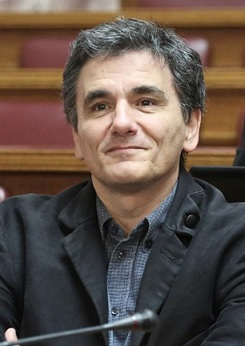On the heels of an overwhelming vote by the Greek people to reject its creditors’ demands for additional austerity as the price of another bailout of the cash-strapped government, colorful Finance Minister Yanis Varoufakis announced his resignation. It was, to say the least, an unexpected move. Varoufakis had indeed pledged to resign -- but only if the vote went the other way.
The news was no doubt greeted with pleasure by a number of Varoufakis’s former counterparts in the Eurogroup, which is made up of the finance ministers of the European countries that have adopted the euro as a common currency. Varoufakis’s’ brash personal style – arriving for meetings via motorcycle, branding other Eurogroup officials “terrorists” – did not win him many fans in Brussels.
Related: Greece – What You Need to Know After the ‘No’ Vote
However, whatever celebrating is taking place in the offices of some of Varoufakis’s main antagonists, including Eurogroup President Jeroen Dijsselbloem of the Netherlands and German Finance Minister Wolfgang Schauble, is likely tinged with uncertainty about his successor.
It became clear Monday morning that Varoufakis was pushed out by Greek Prime Minister Alexis Tsipras in the hope that by removing him it might change the tone in meetings with Greece’s creditors. However, it isn’t at all clear that his successor, Euclid Tsakalotos, will be seen as a breath of fresh air.
For one thing, Tsakalotos, formerly the government’s Alternate Foreign Minister for International Economic Relations, has already played a major role in the negotiations that have thus far failed. A professor of economics at the National and Kapodistrian University of Athens, Tsakalotos was named chief bailout negotiator in the spring, seen at the time as a means of insulating the other members of the Eurogroup from Varoufakis.
But while Tsakalotos, a career academic, may be more soft-spoken than Varoufakis, it’s not at all clear that his policies will be substantially different. Described variously as a leftist and a Marxist, Tsakalotos inhabits the left wing of Greece’s already-left-wing government.
Related: Greece’s Surprise ‘No’ Vote a Big Defeat for Europe
Born in Rotterdam, Tsakalotos spent most of his life not in Greece but in England, where he attended the exclusive prep school St. Paul’s in London before moving on to Oxford, where he ultimately received a Ph.D. in economics. Though a member of the Greek parliament and a senior figure within the Syriza Party, Tsakalotos’ Greek carries a perceptible English accent.
His pan-European background, however, does not herald a greater willingness to bend to the demands of Greece’s creditors than Varoufakis demonstrated. In fact, while Varoufakis was an early and ardent supporter of the European Union project, Tsakalotos was more skeptical. (He has said that his preference now is for Greece to remain in the eurozone.)
Tsakalotos’s personal opinion of the origins of the Greek crisis flies in the face of the conventional wisdom of the country’s creditors, who claim that an outsized central government, excessively tight labor laws, and too much government borrowing combined to turn the Greek economy into an invalid that could only be cured through that forceful application of austerity measures.
Not so, said Tsakalotos in Crucible of Resistance: Greece, the Eurozone & the World Economic Crisis, a 2012 book he co-authored. The narrative in which Greece is an “exceptional” case in Europe that must be brought into line is “a version of [German Chancellor] Angela Merkel’s Calvinist fable, in which the unrighteous need to be punished for their past failings – both for their own good and ‘pour encourager les autres.’”
Related: EU Opponents Delight in Greek ‘No’ Vote
Tsakalotos sharply disagrees with what he calls “an exercise in creating collective guilt” and argues instead that Greece’s problems stem not from being too little like the economically liberal countries currently demanding austerity, but in trying to become too much like them.
Some in the media are suggesting that Tsakalotos’ long history with the Syriza Party is part of the reason why he has been brought in, the idea being that he will be better able to sell a package of sharper austerity measures to the party’s voters than Varoufakis would have been.
However, unless Tsakalotos has changed his mind about the relevance of a “Calvinist fable” to the current crisis, members of the Eurogroup may simply find themselves sitting across the table from a slightly more polite and decidedly less flashy version of Yanis Varoufakis.
Top Reads from The Fiscal Times


